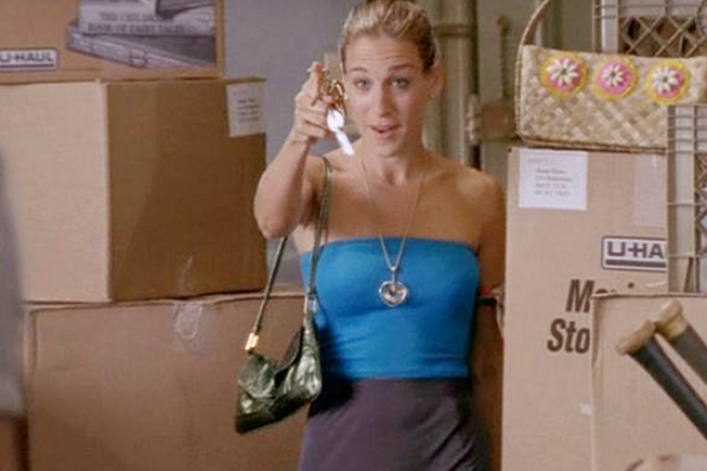Don't let real estate ruin your love life

In honor of this weekend's Valentine's Day, we're revisiting some of our most popular posts that focus on the intersection of love and NYC real estate.
Whether you're stuck in an apartment with a partner you can no longer stand, or just tend to avoid dating anyone who lives on an inconvenient train line, our apartment situations affect most of our love lives more than we'd care to admit. And inevitably, some fights are more common—and more avoidable—than others.
So how to successfully navigate the minefields of dating and New York's real estate market at the same time? Dr. Lynn Saladino, a clinical psychologist who acts as a health and wellness consultant for Mirador Real Estate, shares her best tips on how to stay coupled while facing the city's biggest real estate snafus:
GIVE IT SOME TIME BEFORE YOU SIGN THE LEASE: You'd think we'd all have this down by now, but it bears repeating: Whatever you do, resist the temptation to shack up with someone too early in a relationship just because it's cheap and convenient. "Especially in Manhattan, I see that all the time—'We've been dating four months, we're getting along, my lease is up!'" says Saladino. "So often the relationship isn't quite strong enough to sustain that, and you need more of a base instead of jumping the gun." Besides, it makes sense to give each other a little more time and space before signing a lease with someone you've yet to introduce to your parents. As Saladino puts it, "New York apartments are too small for sharing with a person you don't know well enough."
COMMUNICATE CLEARLY DURING THE HUNT: "Some couples work really well doing projects together, and some couples will kill each other if they do [so]," Saladino explains. "Apartment hunting falls into this category." So you don't find yourselves having a meltdown mid-open house, come up with a list of priorities before you start the search, and if need be, agree to divide and conquer. "Sometimes it can be useful to decide who's going to do the looking, and how you'll search," says Saladino. "If somebody does all the legwork and comes up with 12 apartments—then the other person rejects all of them—it can cause conflict."
DON'T UNDERESTIMATE THE IMPORTANCE OF BREATHING ROOM: Remember that episode of Sex and the City when Carrie tells Aidan she needs to be alone for an hour when she first gets home at the end of the day? She was onto something. "In the adjustment period when people move in, a thing that often comes up is respecting the personal space people need," says Saladino. "A lot of people need a certain amount of time to switch gears, and don't want you asking them a million questions the second they walk in the door."
If you feel like you need a little breathing room, says Saladino, just say so (albeit politely). "Everyone is trying to feel things out to see if it's all working when you first move in, and if things like this go unsaid, people take it the wrong way. If you can verbalize, it's better." If you sense that your partner is a little overloaded, perhaps putter around in another room, or run a few errands outside of the apartment. And try not to take things personally.
Sometimes one person in the couple— like Michael Scott on The Office — may have decor you're not crazy about. You'll just have to deal.
COME TO TERMS WITH EACH OTHERS' DECOR: All those cliches about couples clashing over each other's furniture choices? They're really pretty accurate. And even if you're S.O. isn't coming with any neon beer signs (or "musical baby" posters) in tow, you might run into issues if your pad reflects too much of one person's tastes while excluding the other's. "I find this is especially true when one person is moving into someone else's apartment, because the stuff is already there," says Saladino. "I've even spoken with people who are married and say, 'This doesn't feel like my house!'" If your budget allows, Saladino suggests picking out some new pieces together to help the decorating process feel more collaborative. "If you've got the cash on hand to do, say, the bedroom, that will allow it to feel like a fresh space," she adds.
FIND A SANE WAY TO SPLIT UP THE BILLS: While every couple will approach this one differently, here's the bottom line: You and your partner are going to have an upfront discussion about how to handle your newly shared rent and utilities, and most likely, your respective financial situations as a whole. "A lot of times, that way that bills are split up can sort of indicate the larger picture, or some of balance of power [in the relationship]," Saladino says. You don't necessarily have to split everything right down the middle if, say, your incomes are radically different (or your cultural values dictate that one person takes on the financial burden). Whatever you're preference, though, you're going to have to talk about it. "Finding a plan that feels OK for both people—and avoiding the build-up of resentment—is extremely important," says Saladino, who adds that if the two of you really run into trouble when you try to talk about money matters, it's worth bringing in a third party to mediate.
AFTER A BREAK-UP, GET OUT OF THE APARTMENT ASAP: Granted, this can be easier said than done when you've got all your finances tied up in an apartment, but staying in a shared space with your newly minted ex is best avoided at all costs. "Even if it's on the cordial side, it starts to feel sort of normal to still live together, and things get very blurry if you stay for too long," says Saladino. "You end up not healing fast enough, and pretending like it's all still there when really it's not." If you're torn over who gets to stay in the apartment and who has to pick up and find new digs, Saladino says, she leans "toward cutting your losses. Finding a new space is so therapeutic for people."
Related:
New Yorkers' dating dealbreakers: decor-less apartments, crappy furniture, and... cats
How to handle couple fights when you live in a tiny apartment
Apartment features that can make or break your love life























